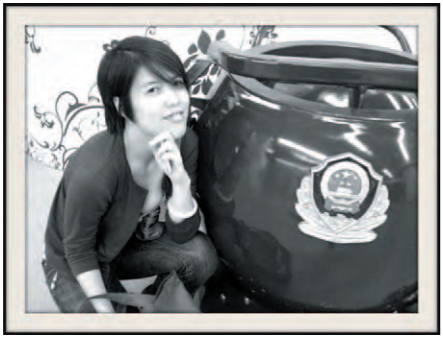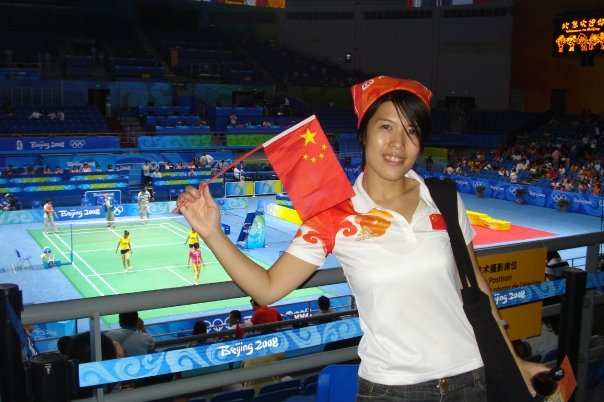Interview by Robyn Ochs
RO: Eva, what a pleasure it is to speak with you! Please tell us about yourself.
EL: I was born and raised in Macau, a former colony of Portugal in eastern China that was returned to China in 1999. It’s a small town with a population of only 200,000. In 2000, when I turned 18, I was admitted to one of China’s top universities in Shanghai. My mother disapproved of my wish to attend because she believes that girls should stay close to home and get just enough education to get a stable job, then marry and have children. Th at’s how she lived her life. I knew all along I would likely become a clone of my mother if I didn’t take control over my own fate. I started tutoring younger children when I was 13, earned some money and saved most of my part-time income. I didn’t argue with my mother when she screamed that she was not going to let me go to Shanghai for school; rather the next morning I went and paid for my own tuition. I brought myself tickets and everything and I went. Since then I have lived in Shanghai and then in Beijing. I never want to go back and live in a small town. Growing up, I had little in common with my peers. Chinese girls of my generation were raised to be obedient and put their own needs after those of their parents, husband and children. Fortunately my mother has two younger sisters who are rebels like me—they didn’t marry but traveled the world whenever they could. I knew I had to take care of myself in order to be a free woman. I’m one of the handful of girls from my high school class of over 150 who now live elsewhere in the world.
RO: Tell briefly your coming out story. How did you become aware that you were bi? How old were you? Who did you tell? What happened?

EL: I knew I was attracted to beautiful boys from age 10. I didn’t realize that I was attracted to androgyny until I met my lifetime entanglement—she was 14 and I was 13. I didn’t know I was sexually attracted to her for a very long time. We were just “best friends” until the summer I turned 17 when it became very apparent that we were much more than friends. I decided to confess my love, otherwise I would burst. But I was afraid and embarrassed to say it directly—so I brought it up casually when we were chatting online. I asked her what she thought of two girls dating each other. She paused for a few minutes and wrote back: “I’m not gay.” I was very hurt. I felt rejected. I did tell a guy friend about my love for a girl, and he gave me moral support.
Then I decided to stick with guys—I dated a bunch of guys in college. When I was 23 I moved to Beijing for a guy I loved but we didn’t work out. Then I met my first girlfriend in a lesbian bar and we felt in love and moved in together. I thought we would be in love forever! So I told everybody that I was in love with a woman. I came out to my colleagues, my classmates, my friends and some of my family members.
But a year and a half year later, I accidentally ran into my first female love in our hometown. We hadn’t seen each other for eight years! But this time the attraction was at its strongest ever—so I told her that I had been in love with her eight years ago. I just wanted to make peace with myself. She was stunned. She eventually said that she has been in love with me, even after all the years we didn’t see each other. She didn’t even remember saying that she wasn’t gay! We fell madly in love this time and I broke up with my first girlfriend for her. But unfortunately she’s a closeted person and I love myself too much to live in the closet, so it didn’t work out.
I’ve had quite a few relationships and none of them worked out—so I’m staying away from relationships for a while! Now I’m an out bisexual woman in my community and I don’t give a damn if some people have a problem with me. I actually don’t like labels but I’m doing the bi label for political reasons— we just have to take one step at a time with the LGBTIQ movement. Currently I’m physically more into masculinity and spiritually more into femininity. But I’m still open to possibilities—I currently have a crush on a FTM (female to male) and I think he’s very cute and has the tenderest heart. But I’m not doing relationships, so it will pass and next time I could see myself falling for a MTF!
RO: What words are used to describe lesbian, gay, bi or non-heterosexual people in China?
EL: “Lala,” for lesbians—it mimics the pronunciation of lesbian in English; “Shuang,” meaning double, for bisexual; “Tongzhi,” meaning comrade, for gay. For non-heterosexual people, we now have the term “Ku’er” mimicking the pronunciation of the word queer in English. But it’s a new term so not very commonly used yet. In China’s gay history, gay men were called “glass” (boli), “rabbit” (tuzi), etc. There was no word for lesbians in the past, or if there was, it’s not commonly known.
RO: What resources—if any—are available for LGBT people in Beijing, and for how long have they existed?
EL: There are always a few gay bars, mostly for gay men. Gay men usually went to the parks too. The LGBT scene in Beijing began to thrive in the past three years. When I first came out in 2005, there were just weekly gatherings for lesbian and bisexual women. Our organizing was in its infancy, with only about 10 women active in lesbian organizing. Over the years, the team has grown to more than 40 people, counting only those who are consistent with their activism. Our regular activities get around 20-30 people, and our annual girls party got almost 300 people in 2008 and over 400 in 2009. Three years ago, I never would have imagined this.
Another indicator of progress is the clubbing scene. Three years ago, there was only one lesbian bar and a Saturday lesbian night at a straight bar. It’s funny and awkward to run into my ex’s exes, since everybody went to the same places. It’s almost like The L Word. But we now have a slightly bigger selection. As far as I know, there are four lesbian bars and three Saturday lesbian nightclubs in Beijing. It’s not many, but still a substantial improvement. Even in Hong Kong or Taipei, there are fewer than four! This change gives you an idea of how lesbian identity has grown stronger. And I can tell you, only a very small number of the lesbians I know go to lesbian bars regularly. But these bars seem to making some good money.
RO: You have traveled extensively and made connections with LGBT activists abroad. What value, if any, do you see in international activism, in particular in keeping in touch with bi activists in other countries? Do you think the movement in China has been inspired/influenced by movements in other countries, or has been an inspiration/influence on others?
EL: International activism has definitely helped and will continue to help our activism in China, simply because it shows that we are not alone in this fight—we can support and learn from each other! Personally, I get so much positive energy from my international peers! Their dedication and bravery have been my source of strength and driving force. They made me an LGBT activist. I do think China has been influenced by movements in other countries—look at our vocabulary for LGBT people! China has been inspired by Western influences, some good and some bad. In terms of the LGBT movement, I’m positive that it’s a good influence for us.
RO: Why do you participate in LGBT activism? What do you get from doing this? Why do you stay involved?
EL: I just have a passion to fight injustice. I have been a feminist all my life—I was treated as secondary to boys when growing up and I had to fight a lot harder for the same rights they have. Th at’s not how I think things should be. As for LGBT activism, I believe that I must do my part if I ever expect my rights to be acknowledged. I saw how things change over time under a lot of activists’ effort, and I want to be part of the change. Doing this empowers me to express my true self.
RO: What are your plans or visions for future activism?
EL: I’m committed to be part of the growing activism in China—I’m pretty hopeful that I will be able to marry a person of my same sex, if I want to. And of course, all kind of anti-discrimination laws to protect LGBT people will be in place. I predict that this will happen within 20 years.

